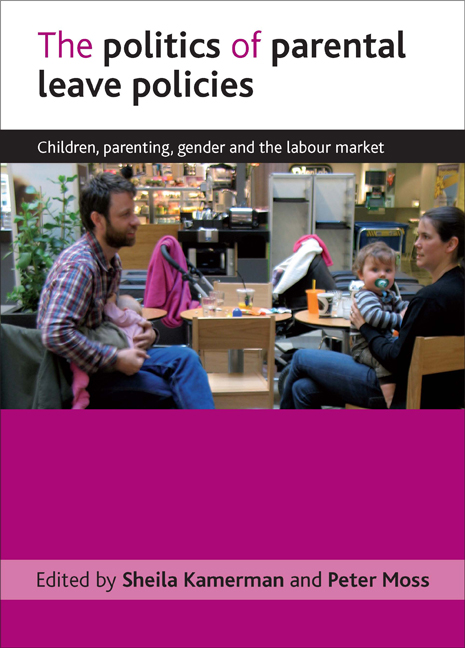Book contents
- Frontmatter
- Contents
- List of tables and figures
- Acknowledgements
- Notes on contributors
- one Introduction
- two Australia: the difficult birth of paid maternity leave
- three Canada and Québec: two policies, one country
- four Czech Republic: normative or choice-oriented system?
- five Estonia: halfway from the Soviet Union to the Nordic countries
- six Finland: negotiating tripartite compromises
- seven France: gender equality a pipe dream?
- eight Germany: taking a Nordic turn?
- nine Hungary and Slovenia: long leave or short?
- ten Iceland: from reluctance to fast-track engineering
- eleven The Netherlands: bridging labour and care
- twelve Norway: the making of the father’s quota
- thirteen Portugal and Spain: two pathways in Southern Europe
- fourteen Sweden: individualisation or free choice in parental leave?
- fifteen The European directive: making supra-national parental leave policy
- sixteen Conclusion
- Appendix
- Index
ten - Iceland: from reluctance to fast-track engineering
Published online by Cambridge University Press: 05 July 2022
- Frontmatter
- Contents
- List of tables and figures
- Acknowledgements
- Notes on contributors
- one Introduction
- two Australia: the difficult birth of paid maternity leave
- three Canada and Québec: two policies, one country
- four Czech Republic: normative or choice-oriented system?
- five Estonia: halfway from the Soviet Union to the Nordic countries
- six Finland: negotiating tripartite compromises
- seven France: gender equality a pipe dream?
- eight Germany: taking a Nordic turn?
- nine Hungary and Slovenia: long leave or short?
- ten Iceland: from reluctance to fast-track engineering
- eleven The Netherlands: bridging labour and care
- twelve Norway: the making of the father’s quota
- thirteen Portugal and Spain: two pathways in Southern Europe
- fourteen Sweden: individualisation or free choice in parental leave?
- fifteen The European directive: making supra-national parental leave policy
- sixteen Conclusion
- Appendix
- Index
Summary
Maternity leave: there is no separate maternity leave. Part of parental leave is reserved for women and women must take 2 weeks of this leave following birth.
Paternity leave: there is no separate paternity leave. Part of parental leave is reserved for men.
Parental leave: 9 months at 80% of earnings up to a ceiling on payment of ISK535,700 a month. Leave can be taken on a part-time (50%) basis and extended in length. Three months are reserved for mothers and 3 months for fathers. The remaining period is a family entitlement and may be taken by either mother or father.
Leave to care for sick children: none
Other: each parent has the right to 13 weeks’ unpaid leave until the child is 8 years old.
Iceland is a Nordic country, but not a member state of the European Union (EU). It does not have separate maternity, paternity and parental leaves, but a single system of ‘birth leave’, the period of leave divided equally between mothers, fathers and a family portion to be divided as parents choose. Prior to the recent introduction of the father's quota, few fathers took any leave. But the latest figures (for 2006) show that now most take leave; 88 fathers take leave for every 100 mothers taking leave, using on average 100 days compared with 185 days for mothers. This means that most fathers take the part of parental leave reserved for fathers, but only a small minority (19% in 2005) took any of the period that parents can share; 90% of mothers took some or all of this period.
Introduction
Parental leave in Iceland has been developing since the Second World War. Until recently it was a highly complex, patchwork system that distinguished between different groups of women and men, with various entitlements and payments. The rights of women depended on whether they worked in the public or private sector of the labour market; while the system provided certain groups of men with limited entitlements and totally excluded others. The parental leave reforms from the year 2000 brought revolutionary changes with 3 months’ leave for each parent, in addition to 3 months to share – a total of 9 months. As a result, men in Iceland have the longest non-transferable father's leave quota in the world.
- Type
- Chapter
- Information
- The Politics of Parental Leave PoliciesChildren, Parenting, Gender and the Labour Market, pp. 159 - 174Publisher: Bristol University PressPrint publication year: 2009



